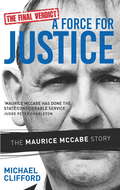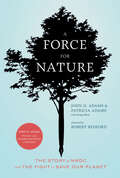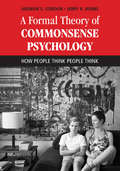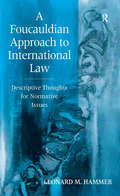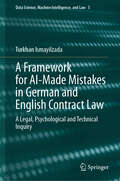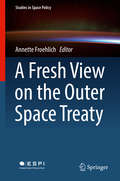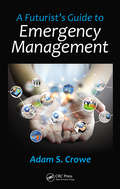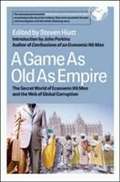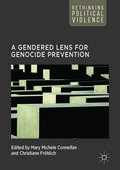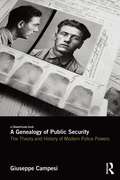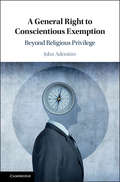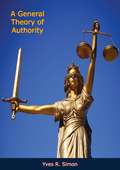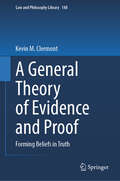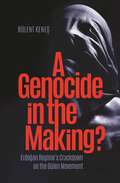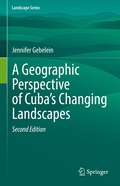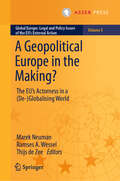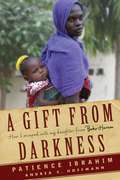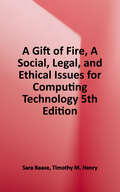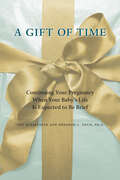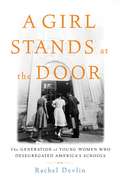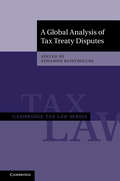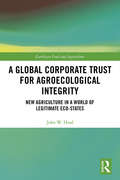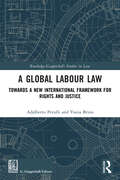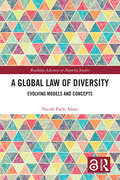- Table View
- List View
A Force for Justice: The Maurice McCabe Story
by Michael CliffordTHE UPDATED BESTSELLERSergeant Maurice McCabe never set out to be a whistleblower. When, in 2008, he complained of shoddy investigations into serious crime in County Cavan, nothing could have prepared him for what was in store.For exposing gross incompetence and corruption within An Garda Síochána, he endured vilification, bullying and harassment by forces who wanted to bury him and his inconvenient truths. Worse still were the vicious rumours and falsehoods, which had a devastating effect on his whole family.Their painful journey to vindication was only completed in October 2018, with the publication of the Disclosures Tribunal report, which revealed how ex-Garda Commissioner Martin Callinan and Superintendent Dave Taylor had conducted a campaign of 'calumny' against 'an officer of exemplary character'. From the award-winning journalist who first broke the story, A Force for Justice is the definitive account of the greatest scandal ever to emerge from the Irish police force, and the personal price paid by Maurice McCabe in pursuit of his duty to serve the state.
A Force for Nature: The Story of NRDC and the Fight to Save Our Planet
by John H. Adams Patricia Adams Air Vice Marshal George BlackThe pioneering environmental activist recounts his decades-long fight for our planet through the NDRC—with a foreword by Robert Redford.In 1970, John H. Adams was fed up with the levels of pollution in New York City. How could he raise children in a place where layers of soot covered the windows? Working as a lawyer for the U.S. Attorney’s office, he and fellow lawyers teamed up to form Natural Resources Defense Council, a grassroots environmental advocacy group. Over the years, NDRC has grown into an international powerhouse with 1.2 million members and a staff of scientists and lawyers whose mission is to safeguard the planet. This inspiring memoir tells the story of the NRDC and the environmental movement it sparked.
A Formal Theory of Commonsense Psychology: How People Think People Think
by Andrew S. Gordon Jerry R. HobbsCommonsense psychology refers to the implicit theories that we all use to make sense of people's behavior in terms of their beliefs, goals, plans, and emotions. These are also the theories we employ when we anthropomorphize complex machines and computers as if they had humanlike mental lives. In order to successfully cooperate and communicate with people, these theories will need to be represented explicitly in future artificial intelligence systems. This book provides a large-scale logical formalization of commonsense psychology in support of humanlike artificial intelligence. It uses formal logic to encode the deep lexical semantics of the full breadth of psychological words and phrases, providing fourteen hundred axioms of first-order logic organized into twenty-nine commonsense psychology theories and sixteen background theories. This in-depth exploration of human commonsense reasoning for artificial intelligence researchers, linguists, and cognitive and social psychologists will serve as a foundation for the development of humanlike artificial intelligence.
A Foucauldian Approach to International Law: Descriptive Thoughts for Normative Issues
by Leonard M. HammerFoucault's challenging view of power and knowledge as the basis for interpreting the international system forms the central themes of this book. As the application of international law expands and develops this book considers how Foucault's approach may create a viable framework that is not beset by ontological issues. With International law essentially stuck within an older framework of outmoded statist approaches, and overly broad understanding of the significance of external actors such as international organizations; current interpretations are either rooted in a narrow attempt to demonstrate a functioning normative structure or interpret developments as reflective of some emerging and somewhat unwieldy ethical order. This book therefore aims to ameliorate the approaches of a number of different 'schools' within the disciplines of international law and international relations, without being wedded to a single concept. Current scholarship in international law tends to favour an unresolved critique, a utopian vision, or to refer to other disciplines like international relations without fully explaining the significance or importance of taking such a step. This book analyses a variety of problems and issues that have surfaced within the international system and provides a framework for consideration of these issues, with a view towards accounting for ongoing developments in the international arena.
A Framework for AI-Made Mistakes in German and English Contract Law: A Legal, Psychological and Technical Inquiry (Data Science, Machine Intelligence, and Law #5)
by Turkhan IsmayilzadaThis book tries to answer the question “What happens if an AI system makes a mistake while contracting?” by applying an interdisciplinary and comparative legal methodology. It offers a tantalizing glimpse into the intricate web of legal, psychological, and technical phenomena involved, and how they are interconnected within the realm of contractual mistake doctrine as we know it today. It covers a wide range of topics, including the common origins of German and English contract law, the pivotal role of intentions as a prerequisite for effectual contracts in both jurisdictions, the classification of and psychological approach to contractual mistakes, and the complexities of AI’s participation in contract law. Particular attention is paid to the juxtaposition of human- and AI-made mistakes from the perspective of information processing. As a result, the book offers a jurisdiction-agnostic framework for AI-made contractual mistakes that can aid legislators and policymakers in their deliberations on the regulation of AI in contract law. The framework considers cultural and historical differences between German and English contract law, and thus proposes an approach that can fit both (and potentially other similar) jurisdictions with minor adjustments. In addition to these novel discussions, the work explores the views of prominent scholars and international experts in the field. As such, it will appeal to researchers and scholars in the fields of law, technology, psychology, and (especially) Artificial Intelligence. By presenting “a framework for AI-made mistakes in German and English contract law,” Dr. Ismayilzada offers a valuable contribution to the field, inviting readers to explore the uncharted territory of AI and the law. Join the author on this intellectual journey and gain insights that will redefine your perception of contracts in the age of AI.
A Fresh View on the Outer Space Treaty (Studies in Space Policy #13)
by Annette FroehlichOn the occasion of the 50th anniversary of the Outer Space Treaty this book gives a first insight into where the next generation considers room for further improvement of the Outer Space Treaty in order to cope with upcoming aspects such as providing solutions for the emerging commercial, economic, environmental and social questions. At the time of the adoption of the Outer Space Treaty in 1967 the purpose of this treaty was to avoid conflicting military situations in space. However, 50 years later the Outer Space Treaty is n demand to meet the ever increasing space activities and the different actors involved such as the rise of the private sector players.
A Futurist's Guide to Emergency Management
by Adam S. CroweA Futurist's Guide to Emergency Management provides interdisciplinary analysis on how particular sets of conditions may occur in the future by evaluating global trends, possible scenarios, emerging conditions, and various other elements of risk management. Firmly based in science, the book leverages historical data, current best practices, and scie
A Game as Old as Empire: The Secret World of Economic Hit Men and the Web of Global Corruption
by Steven HiattThis may well be the most pivotal and exciting time in the history of a nation that is built on pivotal and exciting events. How you and I choose to react to this global empire in the coming years is likely to determine the future of our planet. Will we continue along a road marked by violence, exploitation of others, and ultimately the likelihood of our self-destruction as a species? Or will we create a world our children will be proud to inherit? The choice is ours--yours and mine.
A Game of Inches: A Jack Patterson Thriller (A Jack Patterson Thriller #3)
by Webb HubbellBilly Hopper’s life is pretty damn good. He’s a wide receiver for the Los Angeles Lobos and he’s just been named Rookie of the Year. But he’s about to lose it all. On a frigid March morning at the Mayflower Hotel in Washington, D.C., Billy wakes up to find that he’s been sleeping with a dead girl. And now he’s got her blood on his hands—literally. But he’s also got Jack Patterson: a D.C. lawyer who’s determined to get to the bottom of the murder and prove Billy’s innocence. There’s only one problem. They’re at war with a powerful, sinister man, and the people closest to Jack are in the line of fire. Can Jack and his team solve this case before his family pays the ultimate price? This latest Jack Patterson thriller exposes the underbelly of the NFL and the role of big money in shady D.C. politics. Believe it or not, murder is just the tip of the iceberg.
A Gendered Lens for Genocide Prevention (Rethinking Political Violence)
by Mary Michele Connellan Christiane FröhlichThis edited collection develops a gendered lens for genocide prevention by uncovering socially constructed gender roles which are crucial for the onset, form and prevention of genocide and mass atrocities. This volume draws on contemporary feminist theory, concepts of masculinity, critical discussions of international law, and in-depth case studies to provide a better understanding of the function of gender at different stages of genocide and mass atrocity processes as well as a basis for more comprehensive strategies for genocide prevention.
A Genealogy of Public Security: The Theory and History of Modern Police Powers
by Giuseppe CampesiThere are many histories of the police as a law-enforcement institution, but no genealogy of the police as a form of power. This book provides a genealogy of modern police by tracing the evolution of "police science" and of police institutions in Europe, from the ancien régime to the early 19th century. Drawing on the theoretical path outlined by Michel Foucault at the crossroads between historical sociology, critical legal theory and critical criminology, it shows how the development of police power was an integral part of the birth of the modern state’s governmental rationalities and how police institutions were conceived as political technologies for the government and social disciplining of populations. Understanding the modern police not as an institution at the service of the judiciary and the law, but as a complex political technology for governing the economic and social processes typical of modern capitalist societies, this book shows how the police have played an active role in actually shaping order, rather than merely preserving it.
A General Right to Conscientious Exemption: Beyond Religious Privilege
by John AdenitireThe book argues that there is in the US, Canada and UK, a general right to conscientious exemption available to a person who objects to any legal obligation whatsoever on the basis of a religious or non-religious conscientious belief. The book provides a liberal defence of this right and argues that it should be considered a defining feature of a liberal democracy. A general right to conscientious exemption is a legal right to conscientiously object to any obligation imposed by law and to receive from a court an exemption from complying with such obligation. The general right defended in the book is not an absolute right. A court may refuse to grant an exemption if doing so would disproportionately impact the rights of others or the public interest. The book suggests how the general right should be balanced against important rights, such as non-discrimination on the basis of sexual orientation.
A General Theory of Authority
by Yves R. SimonA General Theory of Authority was first printed in 1962 and is a classic treatment of authority and its relation to justice, life, truth, and order. In recent years authority has been seen as an enemy of freedom, autonomy, and development. In this book the renowned philosopher Yves R. Simon, himself a passionate proponent of liberty, analyzes the idea of authority and defends it as an essential concomitant of liberty. Simon sees authority as the catalyst necessary to bring together the seemingly disparate demands of liberty on one hand and order on the other.Simon’s perceptive discussion of how authority differs from law enables him to highlight the effective and personal role that authority can play in the life of the individual and for the good of the community.Professor Yves R. Simon was an esteemed philosopher and teacher at several American universities, including Notre Dame and the University of Chicago. He published numerous books and articles, many of which remain as classic pieces of political and social philosophy. Professor Simon died in 1961.
A General Theory of Evidence and Proof: Forming Beliefs in Truth (Law and Philosophy Library #148)
by Kevin M. ClermontThis book reframes the fundamentals of decisionmaking under uncertainty. For almost a century, theorists have spoken of truth-finding in terms of probability. They have said things like some past fact was 51% certain or proclaimed that in a civil dispute a fact must be shown to exceed a 50% likelihood. But such talk is a misleading misconception. The reason is that traditional probability fails to distinguish epistemic uncertainty from aleatory uncertainty. This conflation leads to mistakes such as invoking probability’s product rules, which calculate a conjunction’s likelihood as being low. From there, the theorists have argued that in a myriad of ways, the law violates the probability calculus unforgivably. Today, other theorists are newly realizing that in large part the law does not deal in probability. They now can defend the way that law has found facts since long before the invention of probability and on to the present. They are also reevaluating such intuitive practices as those that humans use in daily life to combine inferences upon inferences. A hotly contested literature has emerged. In a significant, comprehensive, and original contribution, this book develops a theoretical justification for the intuitive approaches that humans deploy across a broad range of decisionmaking. Instead of probability, the book focuses on degrees of belief that estimate, given the state of the evidence, how far a proposition has been fully proven. Instead of combining findings by the rules of probability, the book uses the rules of multivalent logic. The aim is to illuminate decisionmaking outside statistical analysis, showing that our ancient wisdom is in fact theoretically solid. The target is everyone interested in improving decisionmaking.
A Genocide in the Making?: Erdogan Regime's Crackdown on the Gülen Movement
by Bulent KenesThe Turkish government under the Erdoğan regime is undertaking a brutal crackdown against the participants of a civic group, namely the Gülen movement, also known as the Hizmet (service) movement, with the deliberate intention of destroying this social group, in whole or in part. In this extensive research, Dr. Keneş argues that this crackdown is filled with violations that may be classified at the very least as crimes against humanity and could very well be the harbinger of what comes next in terms of a full-scale genocide to exterminate thousands of innocent people. Keneş exemplifies many of these crimes and scales them against the genocide criteria according to definitions and norms accepted by United Nations and field experts.Given that the international community has historically downplayed the early signs of genocidal acts and thus failed to prevent such crimes many times before, it is necessary to be on the alert before the Erdoğan regime goes that far. A Genocide in the Making? is a unique volume that loudly cries out to the world this highly probable risk before it is too late.
A Geographic Perspective of Cuba’s Changing Landscapes (Landscape Series #33)
by Jennifer GebeleinThis book is based on research that gives the reader a nonfiction view of how Cuba’s landscape has changed since the time when Columbus first set foot on the island and encountered the Indigenous peoples who lived there in 1492 to present day.An analysis of landscape change over time is presented and that transformation from a heavily forested island to less than (currently) 18% forest cover is described. The government has established a system of protected areas and strong governmental controls over environmental policies and the manner with which the island can be built upon by foreign investors, urban expansion projects, or natural resource exploitation.Current GIS and remote sensing research of Cuba’s atmosphere, physical landscape and aquatic features is provided to underscore the complex environmental structures that epitomize Cuba. The author discusses past, present and future impact factors including history, technological assessments, laws and policies, relationships with other countries and education.
A Geopolitical Europe in the Making?: The EU’s Actorness in a (De-)Globalising World (Global Europe: Legal and Policy Issues of the EU’s External Action #5)
by Ramses A. Wessel Marek Neuman Thijs De ZeeThis edited book investigates whether ─ and if so, to what extent ─ the European Union began to turn its recently uttered ambition of becoming a geopolitical Union into practice. It does so by bringing a range of scholars from various institutions and disciplines ─ among others, political science, European law, European studies ─ together, asking them whether in their specific field, they can observe a geopolitical turn in the European Union's policy-making. The result of this intellectual endeavour can be found in this book; a book that makes a first attempt at empirically testing the Union's ability to effectively respond to ever- and rapidly-changing conditions for conducting international politics in a rule-based system. The volume is divided into two separate, yet mutually informing, parts. Part I consists of a series of empirical chapters assessing the EU's actorness vis-à-vis other regional powers, regional and international organisations. This is followed by several empirical snapshots looking into specific policy areas in Part II. As we combine the insights from both parts, we attempt to contribute to the debate on the changing nature of the European Union in challenging times. Our approach, then, is primarily an empirical one. And yet, building upon these conclusions, we are able to also draw conceptual conclusions about the EU's increasing geopolitical nature, or the lack thereof. These conclusions make this a relevant read not only for academics, but also for practitioners of European law and European integration. Marek Neuman is Assistant Professor in EU Foreign Policy and Jean Monnet Chair of European Politics and Governance at the Faculty of Arts of the University of Groningen, The Netherlands. Ramses A. Wessel is Professor of European Law at the Faculty of Law of the University of Groningen, The Netherlands. Thijs de Zee is a PhD Candidate at the Faculty Campus Fryslân of the University of Groningen, The Netherlands. Chapter 3 is available open access under a Creative Commons Attribution 4.0 International License via link.springer.com.
A Gift from Darkness
by Andrea Claudia Hoffmann Patience IbrahimThe inspirational story of a pregnant young Nigerian woman and the horrors she endured to save her unborn child when she was kidnapped by Boko Haram.When she was nineteen, Patience Ibrahim's first husband was murdered by Boko Haram. She fled to the safety of her village and remarried several months later. Having prayed for a child for years, Patience is overjoyed when she discovers she is pregnant. But her joy is short-lived: Boko Haram soldiers are at her door. Brutally abducted and forced to convert to Islam, she lives in constant terror of what her kidnappers have in store for her. She finds herself alone in the world and fears her life is over. For two months, Patience hides her pregnancy while facing the brutalities meted out by Boko Haram. By the sheer force of her determination to protect her baby, she and her child are able to survive. Now, she has entrusted journalist Andrea C. Hoffmann with her story, a powerful first-person account of Boko Haram's atrocities in Nigeria and Cameroon.One of the first testimonies on the terrorist group's war crimes in Western Africa, A Gift from Darkness poignantly shows the human toll of a crisis that demands attention.
A Gift of Fire: Social, Legal, and Ethical Issues for Computing Technology
by Sara Baase Timothy M. HenryFor courses in Computer Ethics and Computers and Society. An objective study of technology ethics that inspires critical thinking and debate, <p><p> In Gift of Fire, A: Social, Legal, and Ethical Issues for Computing Technology, Sara Baase presents a balanced exploration of the social, legal, philosophical, ethical, political, constitutional, and economic implications of computing and the controversies they raise. With an objective computer scientist's perspective, and with historical context for many issues, Baase covers the issues readers will face both as members of a technological society and as professionals in computer-related fields. A primary goal is to develop computer professionals who understand the implications of what they create and how it fits into society at large. This text encourages readers to think about the ethics and philosophical direction behind topics but doesn't lead students to conclusions. <p><p>The 5th Edition contains updated material on new topics and examples, outdated material has been removed, and several topics have been reorganized. New material appears throughout, including material on current trending topics such as drones and autonomous cars.
A Gift of Time: Continuing Your Pregnancy When Your Baby's Life Is Expected to Be Brief
by Amy Kuebelbeck Deborah L. DavisA Gift of Time is a gentle and practical guide for parents who decide to continue their pregnancy knowing that their baby's life will be brief. When prenatal testing reveals that an unborn child is expected to die before or shortly after birth, some parents will choose to proceed with the pregnancy and to welcome their child into the world. With compassion and support, A Gift of Time walks them step-by-step through this challenging and emotional experience—from the infant's life-limiting prenatal diagnosis and the decision to have the baby to coping with the pregnancy and making plans for the baby’s birth and death. A Gift of Time also offers inspiration and reassurance through the memories of numerous parents who have loved a child who did not survive. Their moving experiences are stories of grief—and of hope. Their anguish over the prenatal diagnosis turns to joy and love during the birth of their child and to gratitude and peace when reflecting on their baby’s short life.Full of practical suggestions for parents and for caregivers, A Gift of Time also features the innovative concept of perinatal hospice and palliative care. Caring and thoughtful, the book helps parents embrace the extraordinary time they will have with their child.
A Girl Stands at the Door: The Generation of Young Women Who Desegregated America's Schools
by Rachel DevlinA new history of school desegregation in America, revealing how girls and women led the fight for interracial educationThe struggle to desegregate America's schools was a grassroots movement, and young women were its vanguard. In the late 1940s, parents began to file desegregation lawsuits with their daughters, forcing Thurgood Marshall and other civil rights lawyers to take up the issue and bring it to the Supreme Court. After the Brown v. Board of Education ruling, girls far outnumbered boys in volunteering to desegregate formerly all-white schools.In A Girl Stands at the Door, historian Rachel Devlin tells the remarkable stories of these desegregation pioneers. She also explains why black girls were seen, and saw themselves, as responsible for the difficult work of reaching across the color line in public schools. Highlighting the extraordinary bravery of young black women, this bold revisionist account illuminates today's ongoing struggles for equality.
A Global Analysis of Tax Treaty Disputes (Cambridge Tax Law Series)
by Eduardo BaistrocchiThis two-volume set offers an in-depth analysis of the leading tax treaty disputes in the G20 and beyond within the first century of international tax law. Including country-by-country and thematic analyses, the study is structured around a novel global taxonomy of tax treaty disputes and includes an unprecedented dataset with over 1500 leading tax treaty cases. By adopting a contextual approach the local expertise of the contributors allows for a thorough and transparent analysis. This set is an important reference tool for anyone implementing or studying international tax regulations and will facilitate the work of courts, tax administrations and practitioners around the world. It is designed to complement model conventions such as the OECD Model Tax Convention on Income and on Capital. Together with Resolving Transfer Pricing Disputes (2012), it is a comprehensive addition to current debate on the international tax law regime. Provides law-in-context analysis of the international tax regime, with contributions from authors working in numerous jurisdictions Features country-by-country and topic-by-topic analyses of leading tax treaty disputes Includes a comprehensive dataset of over 1,500 leading tax treaty disputes as supplementary material
A Global Corporate Trust for Agroecological Integrity: New Agriculture in a World of Legitimate Eco-states (Earthscan Food and Agriculture)
by John W. HeadThis book examines global environmental governance and how legal, institutional, and conceptual reform can facilitate a transformation to a new ‘natural-systems’ form of agriculture. Profound global climate disruption makes it essential that we replace our current agricultural system – described in this book as a fossil-carbon-dependent ‘modern extractive agriculture’ – with a natural-systems agriculture featuring perennial grains growing in polycultures, thereby mimicking the natural grassland and forest ecosystems that modern extractive agriculture has largely destroyed. After examining relevant international legal and conceptual foundations (sovereignty, federalism, global governance) and existing international organizations focusing on agriculture, the book explores legal and institutional opportunities to facilitate dramatic agricultural reform and ecological restoration. Among other things, it explains how innovative federalism structures around the world provide patterns for reorienting global environmental governance, including what the book calls eco-states that would, through exercise of pluralistic sovereignty, be responsible for agroecological management. Drawing from his experience working in international institutions, the author provides detailed global-governance proposals for facilitating the type of agricultural reform that can help avoid ecological collapse, especially through soil degradation and climate change. This book will be of great interest to students and scholars of international law, agroecology, climate change, ecological restoration, sustainable development, and global governance, as well as policy-makers and practitioners working in these fields.
A Global Labour Law: Towards a New International Framework for Rights and Justice (Routledge-Giappichelli Studies in Law)
by Adalberto Perulli Vania BrinoThis book explores the prospects of a global labour law system. Global labour law is understood as a still non-coherent set ofnorms that at different levels and with different legal effectiveness regulate legal labour relations, promote respect for fundamental social rights, and condition the behavior of the multinational enterprise, from a social justice and sustainability perspective. The book deals with both international labour law and regulatory instruments of different kinds, such as social clauses in international trade treaties or corporate codes of conduct, transnational collective bargaining, and EU directives on due diligence. This complex normative “system” is partly reconstructed and partly subjected to critique, with the aim of producing a hybrid handbook in which the elements of normative knowledge are accompanied by problematic reasoning about the forms, contents and purposes of a possible global labour law. The book will be of interest to academics, researchers and policy-makers working in the areas of Labour Law, Employment Law, International Human Rights Law and Social Justice.
A Global Law of Diversity: Evolving Models and Concepts (Routledge Advances in Minority Studies)
by Nicolò Paolo AlessiThis book provides a global perspective on the accommodation of diversity within constitutional traditions, considering the most innovative approaches and legal instruments of the Global North and Global South. This field of study, traditionally dominated by a Global North approach based on majority-minority and rights-based discourse, is undergoing significant development. The work thus assesses the appropriateness of the existing mainstream theoretical tools and concepts – in particular minority and minority-related concepts as well as rights discourse – to grasp the ongoing evolution of this field of law. A reconsideration of the traditional conceptual categories and the introduction of the concept “Law of Diversity” is proposed as a theoretical framework to grasp the ongoing developments in this area. Among the models studied, those that are referred to as emergent models for the accommodation of diversity in the Global North appear to be particularly in need of theoretical recognition. To this end, the theory of federalism is used to serve a rather unexplored theoretical function. Federal theory is put forward as a theoretical instrument to frame and explain the emergent instruments for the accommodation of diversity, as well as provide practical solutions for their development. The book will be of interest to researchers, academics, and policy-makers working in the areas of comparative constitutional law, minority and indigenous rights law, and federal studies.The Open Access version of this book, available at http://www.taylorfrancis.com, has been made available under a Creative Commons Attribution-Non Commercial-No Derivatives (CC-BY-NC-ND) 4.0 license.
